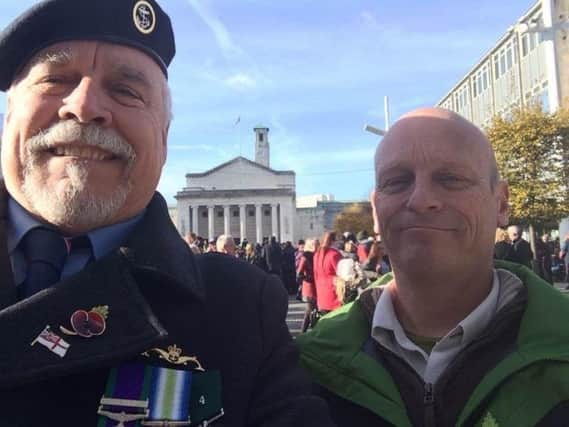Veteran sues MoD for return of medals after dismissal 'for being gay'


Joe Ousalice, 68, was cleared at a court martial in 1993 after he was accused of being in bed with another sailor.
Mr Ousalice always denied the charge, but said he was forced to reveal his bisexuality at to the court and was discharged from the Navy because he might "corrupt" others.
Advertisement
Hide AdAdvertisement
Hide AdThe judgment brought an end to his 18-year naval career, during which he served in the Falklands, Northern Ireland and the Middle East.
The Navy confiscated his medal and three Good Conduct badges at the time of his dismissal.
He is now taking the MoD to court to have them returned.
Mr Ousalice's lawyers, from human rights organisation Liberty, argue that he was discharged "entirely because of his sexuality".
The group wants other medals that were confiscated from military personnel because of their sexuality to be returned to them.
Advertisement
Hide AdAdvertisement
Hide AdGay people were not allowed to serve in the military until a rule change in 2000.
Mr Ousalice said he lived a "double life" while he was in the Navy, and was careful not to associate with other sailors whom he knew were gay.
"I was watching every day what I was saying, what I was doing," he told the BBC.
"After the court martial was completed, a guy came in with a pair of scissors and said 'Sorry, mate, I need your medal', and just cut the medal off me.
Advertisement
Hide AdAdvertisement
Hide Ad"The fact that I had been to the Middle East, to the Falklands, to Northern Ireland six times means a lot to me and that medal is proof to me that I was good enough for all those years, and yet somebody can just come and take it from you."
Mr Ousalice told the Press Association: "As far as I know, it's never as bad as it once was but nevertheless it still goes on.
"My message to the Navy is to stop being so bigoted and grow up.
"To the people it happened to, I would say go ahead and don't be ashamed of it - fight your case. I'm not the only one who served and lost his medals, there are hundreds of others.
Advertisement
Hide AdAdvertisement
Hide Ad"Every time I've been in touch with them they've never given me a proper answer, just that they're looking into it.
"As nobody ruffles their feathers, they don't care. What I'm doing at the moment is getting them to sit up and think."
This year marks 20 years since a landmark case of Ex-Royal Air Force personnel Jeanette Smith and Graeme Grady.
They took the UK Government to the European Court of Human Rights in 1999 after being discharged from the RAF after investigations into their sexuality.
Advertisement
Hide AdAdvertisement
Hide AdAfter the Government won at both the High Court and Court of Appeal in the UK, the ECHR found that the investigation and discharge was a breach of their right to a private life under Article 8 of the European Convention on Human Rights.
"What happened in '97 in the European courts where the Government lost the case, since then everything has quietened down," said Mr Ousalice.
"In the armed forces you have to rely on each person to save your skin. You have to rely on everyone you work with, otherwise one sour apple and everything falls apart.
"I could rely on all the lads I worked with to do their job but when I was in the armed forces there was always that bigoted attitude and it stemmed from the top.
Advertisement
Hide AdAdvertisement
Hide Ad"You've got officers coming out with comments and things which they shouldn't be.
"You can order somebody to not say something about someone being gay but you can't change that person's attitude."
An MoD spokesman said it would be "inappropriate" to comment as legal proceedings are ongoing.
"We are currently looking at how personnel discharged from service because of their sexuality, or now abolished sexual offences, can have their medals returned," he added.